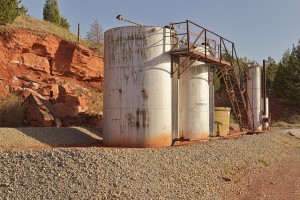Disposal Well Earthquakes are Riskier Than Previously Thought and Could Get Stronger, Scientists Warn
-
Joe Wertz

Katsrcool / Flickr
A tank battery near Edmond, Okla.
Scientists on Thursday said earthquakes triggered by oil and gas disposal wells could become stronger as waste fluid accumulates underground, and the quakes could occur farther away from well sites.
The scientists spoke at the annual meeting of the Seismological Society of America, Aljazeera America’s Renee Lewis reports:
The larger quakes led researchers brought together by the SSA meeting to believe there may be a cumulative effect and that larger, “outlier” earthquakes could become the norm.
Cornell professor and seismologist Katie Keranen, who has written peer-reviewed papers that link disposal wells to Oklahoma’s largest quake — a 5.7-magnitude temblor that injured two and damaged more than a dozen homes in November 2011 — said pressure from large injection wells can “travel tens of kilometers” from the well site.
Keranan also presented an abstract of a study that connects four high-volume disposal wells with an earthquake swarm near Jones, Okla., EnergyWire’s Mike Soraghan reports:
She did not name the wells, but their description fits a cluster of wells in southeastern Oklahoma City owned by New Dominion LLC. The Tulsa company pioneered large-scale “dewatering” — a production method requiring a lot of wastewater disposal — in Oklahoma. The wells all inject more than a million barrels (42 gallons) a month.
Jean Antonides, New Dominion’s vice president of exploration, has previously dismissed any connection between the company’s wells and earthquakes. Attempts to reach him for comment yesterday were unsuccessful.
Several other published studies from independent scientists and researchers at the U.S. Geological Survey have also linked Oklahoma’s exponential increase in earthquakes to disposal wells. The most recent paper, published in March 2014 in the Journal of Geophysical Research, was written by Danielle Sumy at the University of Southern California and researchers at the U.S. Geological Survey, Cornell, Brown and Columbia universities.
Scientists at the seismicity conference also warned that states in the Southwest and Midwest face a special risk from disposal well quakes because their fault systems “have not been mapped extensively,” National Geographic‘s Patrick J. Kiger reports:
Worse yet, scientists are not yet able to predict which wastewater injection sites are likely to pose risks to buildings or critical structures such as power plants, and do not yet know what operators might do to mitigate the hazard. And new research indicates that the disposal wells are capable of affecting earthquake faults that are miles away from them.
